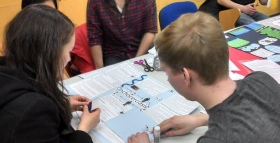Imperial Horizons offers diverse study programme for first and second years

After a successful introductory year, the diverse Imperial Horizons programme of study will be rolled out to second year students from October.
At this year’s June Open Days, prospective undergraduate students had the chance to find out about a new, and possibly surprising, aspect of studying at Imperial. Among the usual departmental and Union information was, for the first time, a stand focused on the Imperial Horizons programme — which offers students the chance to study humanities courses alongside their degree programme.
“We were busy the whole time,” recalls Dr Elizabeth Hauke (School of Professional Development), who delivers part of Horizons. “Students were really excited to come and talk to us about it and were really impressed by the options available. Parents thought it was a really positive thing too.”
Focus on feedback
Horizons was developed as a means to complement the education of undergraduate students giving them an edge in their future career — as well as simply being a way to inspire creativity. It came about after feedback from employers that although Imperial graduates tend to be excellent academically, they sometimes lack the skills required in the workplace. Horizons replaces the Humanities programme which has been running for over 25 years but to which students had limited access in the past.
Horizons consists of about 50 courses from four fields of study – namely, Business and Professional Skills; Languages and Global Citizenship; Global Challenges; and Science, Culture and Society – each offering a number of different modules from ‘Japanese Level 1’ through ‘Science and Faith’.

The Global Challenges courses examine the interface between science, society, politics, ethics and culture in attempting to address pressing matters of worldwide concern. It is designed specifically to put students’ main degrees in a broader context. As such, Elizabeth, who devises and delivers all the course content, consciously opts for alternative forms of learning.
“I want to give the students a different experience so that they develop skills they wouldn’t necessarily pick up sitting in a lecture theatre. We have discussions, debates, group sessions and poster presentations. Students feel able to take risks and express their own opinions, saying things they might not feel confident saying if they know they’re being marked towards their degree — to me that’s really valuable.”
Extending the offer
After a few pilot courses in the Spring of 2012, the full programme was rolled out for all freshers at the start of the academic year in October 2012, with over 1500 students enrolling on at least one course over the year. Feedback on the Student On Line Evaluation (SOLE) tool showed that 72% of students taking Horizons courses rated the content as ‘very good or good,’ while 80% rated the structure and delivery of the teaching sessions as ‘very good or good’.
Horizons started me thinking about alternative career options that I could explore in the future
– Alex Mytenka
Now the scheme is being extended to second year students, allowing them to continue deeper into areas they studied in the first year, or take up something different.
One such individual, Alex Mytenka a Geology student, took both Introduction to Business and a Global Challenges course in his first year at Imperial, and will now try out Italian in his second year.
“Horizons provided some respite from my main degree, but it also started me thinking about alternative career options that I could explore in the future – for example I could go into the business and finance side of my course rather than straight up geology,” says Alex. “On the other hand Global Challenges complemented my degree because I could apply the geology I had learnt to water-resource challenges, for example.”
Uttara Raju, a second-year physics student completed a ‘Science and Policy’ module from the Science, Culture and Society area in the first year and ‘was hooked’ from the start. She now intends to continue in the same area, studying a ‘Politics’ module in the second-year. “What this course has done is increase my confidence when discussing how science affects policy,” says Uttara. “I feel I would be able to have an informed discussion about scientific policy and I am much more interested in learning about the wider aspects of science.”
The Horizons programme is still evolving and there are some issues to be ironed out, such as how completed modules are formally recognised. It’s increasingly looking like Horizons could become a valued part of the wider experience Imperial offers to students.
Article text (excluding photos or graphics) © Imperial College London.
Photos and graphics subject to third party copyright used with permission or © Imperial College London.
Reporter
Andrew Czyzewski
Communications Division